Marketing tactics for ecommerce stores come in many forms, but none of them compare to the power of a quality referral program. We've done the research and spent several weeks testing out the best solutions. After testing, checking with users and establishing the best value, we've come to the decision that Ambassador is currently the best referral software for ecommerce. With its omnichannel capabilities, beautiful ecommerce integrations and numerous forms of referral programs, the Ambassador referral software beats out the rest of the competition with a strong lead. If you're interested in learning more about why Ambassador is so impressive, along with the other solutions you might be interested in, keep reading to learn more.
 Quite a few referral and affiliate programs exist. Some of them are more for ecommerce, while others have the ability to be integrated into any company system. Ambassador does a wonderful job of providing something for everyone, seeing as how the integrations with ecommerce stores are seamless, and the team at Ambassador helps you out with the onboarding process and management throughout. So, if you have a Shopify store it will all go smoothly. The same goes for WooCommerce or Magento or Bigcommerce. All of these are perfectly compatible with Ambassador, making it ideal for startups and big businesses. Here's our in-depth review of Ambassador.
Quite a few referral and affiliate programs exist. Some of them are more for ecommerce, while others have the ability to be integrated into any company system. Ambassador does a wonderful job of providing something for everyone, seeing as how the integrations with ecommerce stores are seamless, and the team at Ambassador helps you out with the onboarding process and management throughout. So, if you have a Shopify store it will all go smoothly. The same goes for WooCommerce or Magento or Bigcommerce. All of these are perfectly compatible with Ambassador, making it ideal for startups and big businesses. Here's our in-depth review of Ambassador.
You'll notice that the monthly pricing is much higher than that of, say, a WordPress plugin, or a regular Shopify app. There's a reason for that. Ambassador has so much packed into it that you should most definitely make back your money with the referrals you receive. If implemented properly, it's bound to be one of the best investments your online store makes.
But there are also plenty of other referral software options to choose from. That's why we'll be discussing some of the runner-ups behind Ambassador. Some companies will be looking for something a little less expensive, while others are more focused on niche referral programs, like for a digital product online store. So, whether you're making the decision because of pricing, or you'd like to get a referral program based on your industry, this article has something for everyone. The point of this is to showcase the best referral programs out there. After that, you can make the decision for yourself.
The process of figuring out the best referral software began with me asking what people want out of an affiliate or referral program. We found that ecommerce professionals are more interested in getting set up with referrals without any hassle. They also want a significant ROI, making it all the more important to have more of a suite with lots of features as opposed to a lightweight app.
Online store owners want some bang for their buck, and this often means that it needs to be an easy system. Not only for the merchants but for the referrers and the people getting the referrals. They shouldn't have to jump through any hoops to get signed up, and it's certainly not a good idea to give referrers a bunch of sloppy links or confusing dashboards for their affiliate programs.
Therefore, the merchants have come to expect features like email and CRM integrations, making the process easier for them. Other features like single sign-ons, cash payouts and multi-language support have been found to improve the experience for the customers doing the referring and those accepting the referrals.
The good news is that Ambassador has all of these features, and you don't have to work with a confusing dashboard or go out and find other apps to integrate with the referral or affiliate program.
As for the types of programs you can run, you have numerous options, making it a rather versatile software.
What types of programs should you be able to run with a referral software??
- Refer-a-Friend Programs
- Affiliate Programs
- Partner Programs
- Influencer Programs
- Brand Advocacy
If you're not able to activate a partner program along with an influencer program, you're already missing out on an abundance of sales and opportunities. Your goal is to make relationships and get people talking about your products or services. Word-of-mouth is still the best way to spread information about your business, but this type of marketing has changed to a more digital environment. Yes, people still talk to each other and make recommendations, but you can't neglect the power of partnering up with other companies, getting customers to refer their friends and offering affiliate links to bloggers.
As mentioned, Ambassador provides all of the programs we listed above, making it the top dog in our eyes.
For example, you can configure an affiliate program where bloggers and other affiliate marketers can signup quickly, get your product links and make a commission for the referrals they bring in. Amazon has one of the most effective affiliate programs on the market since you see their links all over the internet. Why's that the case? Because they make it easy and they give out some great commissions.
But we get it, you don't want to pull the trigger too quickly. The selection process for a referral software sounds intimidating because of the wide range of options and the differences in pricing and features. Therefore, I want to talk about the methodology I used to get to my decision of Ambassador as the top pick. I'll also share the closest runner-ups and their features. So, keep reading to get a taste of what the best referral programs for ecommerce have to offer.
Table of Contents
- Why You Should Trust Us
- Who is it For?
- How I Chose and Tested
- Our Pick: Ambassador
- The Runner-up: Referral Candy
- How the Competitors Compare
- Some Final Thoughts and Things to Remember
Why You Should Trust Us
Earlier in my career, I designed websites that typically had some sort of ecommerce functionality. Most of them were basic stores and they all ran on WordPress. As my career progressed, I discovered some of the wonderful ecommerce platforms that pretty much package all of the online store tools needed into one program. I'm talking about systems like Shopify, Bigcommerce, Volusion and Squarespace.
Therefore, I began testing them out and seeing how I liked each one. It was clear to me that this was going to be big business, so I started constructing articles to guide people when they needed to make the same decision. As the main researcher and in-house expert at Ecommerce Platforms, I scoured the internet for the best online store building tools. This included actual platforms, plugins, apps, themes and more.
Every time a new ecommerce platform comes along I write a review based on a thorough evaluation. The good thing about an ecommerce site builder is that anyone can usually test it out. The only problem is that the average person doesn't usually have the time to go through all of the options. But I do, and I want to assist people in finding the right tools.
Writing reviews is only one part of the job because I must understand the demographics of this blog's readership. I must see what the ecommerce platforms provide in terms of features and connect those features to the needs of readers.
Considering much of ecommerce is about marketing, it makes sense that I eventually discovered how powerful referral programs were. They're usually easy to set up, and they can really make a difference with your margins. Why is this the case? Because people go to bloggers and friends to make purchasing decisions. If you provide an incentive for these people to share, they'll at least give your product or service a look to see if it's worth sharing with everyone they know.
As for the bloggers, the majority of them out there are unbiased, even if they're getting an affiliate commission. The reason for this is because many companies have referral programs. So the bloggers get paid regardless of which ones they recommend.
In short, a referral program is a way to get attention from bloggers and customers. They may have never heard about your brand before. In that case, not having a referral program is going to keep it that way. But, if you implement a referral program it opens their eyes and allows them to test out what you have to offer.
Unlike many ecommerce bloggers, I vigorously test the programs I recommend. The only way I'll ever suggest a referral software, or anything in the ecommerce world for that matter, is if I would use it on my own sites (or client sites). In fact, many of the tools I review end up being part of my arsenal.
As for my review process, many of the tools I review have been on my radar for awhile. I could go to Google and mimic reviews from other people, but that's not my style. I completely shut out what the rest of the world is saying about a product and act like I'm a completely new user for each review. This way, I can make an unbiased decision and come to a conclusion that's valuable for my readers.
Therefore, I have the experience, objectivity and credentials to review referral software, especially when it comes to ecommerce. With an article like this, you'll get in-depth analysis, descriptions for features, lots of screenshots and the right amount of information for you to make an informed decision.
Who is Referral Software For?
Ideally, every company would have a referral program to make it easy for customers to find cool products. This would also be nice for writers and affiliate marketers since it would eliminate some of the bias that could potentially come along with writing about a certain product or industry. But that's not the case, so we just have to live with it.
However, should every business and ecommerce store have a referral software? You're darn right they should.
Even brick and mortar stores should see advantages with a referral software. Think about it. A hardware store sells to people who walk in every single day. Those folks are sure to go back to their family and friends to tell them about their experience. If it was bad or exceptional, they might write a review online and tell people about it. If it was average, they'd probably say nothing.
If you're certain that your customer service is great and the products rock, all of those people you wow could become brand ambassadors.
What about the businesses that don't use ecommerce as much? For example, a small used bookstore might have a wonderful retail store and occasionally post products online or through Amazon to get some extra sales. If that bookstore owner wants to expand the online presence, a referral software is one of the best routes to take. People come into the store and hear about the program. Then they can share the referral links with friends to get a little reward for themselves.
The same goes for a service-based company. Let's say a driveway sealing business is interested in getting more customers for the next summer. The workers speak to each of the customers every time they seal a driveway, so imagine the possibilities if you passed along a business card with information about your referral program. You could give that person $100 (or something similar) for every neighbor they refer to your business.
The cool thing about a referral software is that it doesn't matter how big your organization is. The referral program makes so much sense for the small startup since you're looking for a way to get more customers and get the word out. A larger, more established company always runs into plateaus, and the referral or affiliate program is ideal for reminding customers how great the company is. Not to mention, new product releases thrive with affiliate programs. The bloggers and affiliate marketers are excited to talk about the new item, so you give them even more of a reason to do so.
Affiliate and referral programs also work well for companies that sell bookings, like Airbnb. The travel site gives a travel credit to both the referrer and the person getting the referral. Both sides win and Airbnb gets more business because of it.
How I Chose and Tested the Best Referral Software
Now that everyone is more familiar with referral software and how it can help your online store, let's continue on with the top three referral tools you should consider:
If you've ever searched for referral software in Google, you know that hundreds of solutions are available. Guess what? I've actually tested hundreds. After years of playing around with the tools and seeing how they work in the real world, I've been able to forget about the less promising ones and focus on the ones that stand out. Therefore, I started this review with about 20 rather impressive affiliate and referral software options.
After my search and analysis, I landed upon the three listed above. Why? Because Ambassador has the most promise for an incredible return on investment. Finally, all three of them integrate well with ecommerce platforms and their interfaces are smooth for all users. Referral Candy provides impressive flexibility for start-ups since you can skip the whole monthly payment thing and give the company a cut of all commissions that come in. Not only that, but it's easy to use and the templates are some of the most modern you'll find. Affiliately comes in strong with its pricing, and we like it for entrepreneurs who might feel a little intimidated with too many features packed into one program.

You might be wondering what my criteria are when researching tools for referrals. Some features are must-haves, meaning that I would never sign up for an affiliate software without them. This allows me to get rid of some less impressive software from the start and you don't have to waste time with a program that doesn't have the essentials.
The three must-have features are:
- A great refer-a-friend and affiliate program – It might sound silly that a referral software wouldn't have a refer-a-friend feature, but you'd be surprised. But what this requirement mainly covers is the variety of referral programs packaged into one. For example, I've seen all sorts of WordPress plugins that only provide some sort of simple affiliate system. That's great, but I would also want a refer-a-friend tool if I were running a new online business. As we'll see with the suggestions I give for referral programs, you get even more than that.
- Seamless ecommerce integrations – With ecommerce it always helps to have a quick one-click button for integrating with your software. Otherwise, you get stuck having to mess with code or sitting around waiting for the referral company to configure the software for you. In this day and age, you shouldn't settle for anything less than a quick integration. This might be an app or plugin. For instance, a Shopify app is one of the quickest ways to expand your store. If an app isn't available then you should at least get a guarantee from the referral software company that they can get you integrated within a day or so. This way, you can sit back and have the referral company complete all of the onboarding for you. But ideally, you'd have an app or plugin, whether it be for WooCommerce, Shopify, Magento, Bigcommerce, Volusion, or whatever ecommerce platform you're going with.
- Beautiful design templates – The whole point of setting up a referral program is to make money, but that doesn't mean it has to take you away from your business for a significant period of time. In order to launch a referral program, you need to have web pages dedicated to it. This might involve a signup form or a popup that asks people to recommend your products to friends. Regardless, these pages take work, and you have a business to run. Therefore, the best referral software solutions provide beautiful, modern templates so that all you have to do is update the text a little bit and maybe throw in your logo. This way you don't need to know anything about design or any sort of configuration for the new program.
As you may have assumed, quite a few referral software failed the tests in this first round. It's hard to come by modern free referral program templates, and ecommerce integrations aren't always offered.
The above features are included with quite a few software options, but many of them failed to make the cut. However, the three solutions we've already talked about have done a good job with all three. The only one that doesn't really have templates is Affiliately. And that's one of the main reasons it ended up at the number three spot.
Now that we've explored the most important features, it's time to go a little deeper. Obviously, the three requirements we talked about above are essential, but since the best software options all have these, we need to explore the finer details to pick a winner.
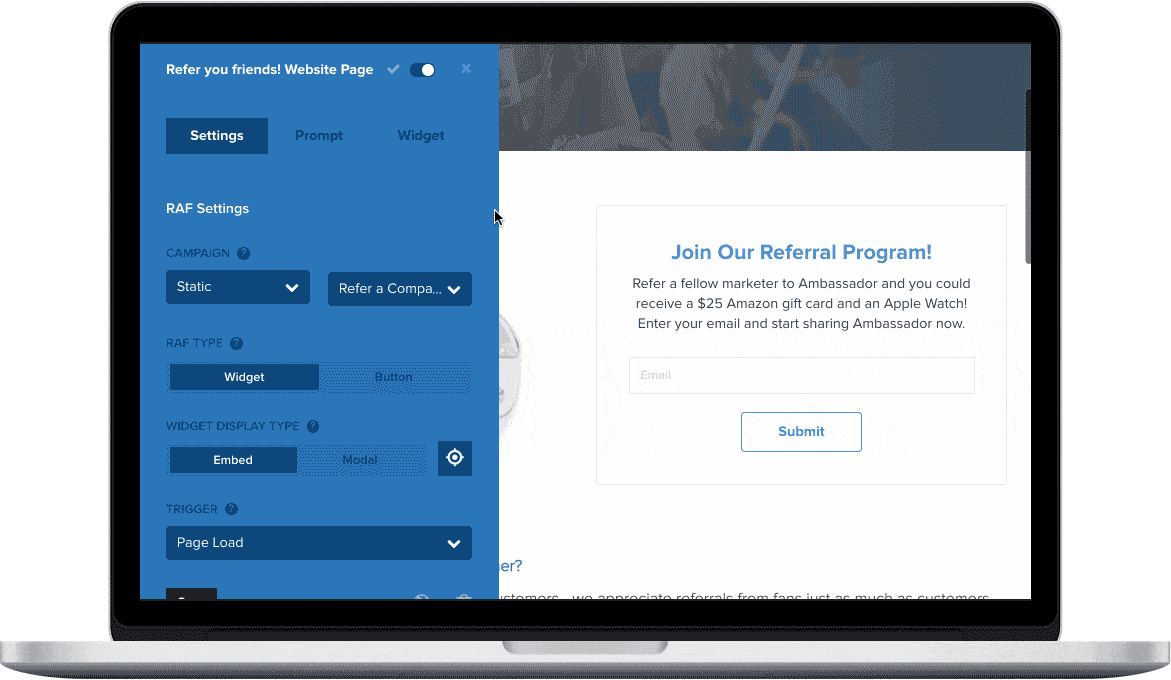
Therefore, I developed a list of tools and features that I feel are the most important for those looking to maximize their success with a referral program. We also took pricing into account, and we'll talk about that later. What's interesting is that the cost gap is pretty huge. So, you should be able to make a decision based on that. However, the higher priced option (Ambassador) is so hard to resist because of its built-in tools.
The additional features that I factor into my ecommerce software analysis include:
- Options for omnichannel selling and referrals – The problem with only having an affiliate or referral program on your website is that customers don't constantly come to your site on a daily basis. Therefore, you need to have the ability to market your referral program on a wide variety of channels. For example, you might sell products on Amazon, but do Amazon sellers actually know about the referral system? The same goes for just about every other sales channel such as eBay and mobile apps.
- The ability to have lots of campaigns going at one time – It's alarming how many referral software solutions I've stumbled upon that only allow you to have one, or only a handful, of campaigns going at one time. Some of these assume that you're only trying to market your company or one product that you sell. That makes sense for small startups or for companies that only have one product (like something you might find on Shark Tank). But the majority of ecommerce stores have huge selections of products, meaning that you don't only want to send referrals to your homepage. In fact, you should have an affiliate link configured for every single product in your store. This way, your affiliates, and referrers are able to grab a link for a specific product and boost your conversions in the process.
- Automated and fast payouts to your affiliates – What's the easiest way to lose affiliate marketers? Don't pay them quickly enough. Let's say you're a tech blogger and you have some affiliate links in your blog post for a WordPress theme. You give this WordPress theme company dozens of sales each month, but they only pay out at the end of the month. That's awful. People want to get paid for the work they put in, so they shouldn't have to wait a full month to get money after they've pretty much done all of the marketing work for you. Treat your affiliates with respect and you should start to see more reviews written about your company. A good way to keep up with your payments is by having an automated payment system. Therefore, we recommend finding a referral program with these automated tools.
- Integrations with CRMs – A customer relationship management software strengthens bonds with your customers, but it can also allow you to keep track of your affiliates. Heck, what would happen if you had a great blogger who raves about your business, but then they left because you never acknowledged them with a bonus or thank you of some sort? Creating relationships with your affiliates can go a long way. These are the people on the frontlines, marketing your product and giving the actual consumers a less biased take on what you have to offer.
- Email automation – There's no way to keep track of all of the emails going in and out of a referral program. The best software has built-in email automation, which goes out to all of the stakeholders in the affiliate or referral program. For instance, imagine a current customer refers their friend to try out your business. Both of those people should get emails with their rewards, and you should get an email with the information on that referral. If those emails don't go out no one knows what's going on. It's also nice when you have replacement tags in the emails for personalization.
- Advanced reports and analytics – Do you have any idea how much money has come in because of your referral program? If not, you should definitely reconsider your software. There's a good chance you pay a monthly fee for the software, so you should at least be able to figure out if you're making your money back. We also like to see things like the number of affiliates you have in your program, along with ROI, click-throughs, referral acceptance rates and more.
- Multiple currencies and languages – Take a look at your Google Analytics and see how many people come to your online store from foreign countries. You might notice that some people from Germany are buying from your store. Lots of folks in Germany speak English, but what about those who don't? Germany has already shown potential with the small batch of current customers, so you might be leaving money on the table with those people who simply can't understand your website. So, a translation plugin should be installed on your website, along with a quality referral program that supports multiple languages and currencies.
Our Pick for Best Referral Software for Ecommerce: Ambassador
Quite a few wonderful referral programs exhist out there. I've tried many of them with my clients and online stores, and you can even search through the WordPress plugin library or the Shopify app store to locate acceptable referral programs for your store. However, Ambassador still gets our vote as the clear victor. This doesn't mean that you should immedietely run out and sign up for Ambassador. This article is meant to give you all of the information you need. However, I still recommend signing up for a demo and seeing if it's perfect for your business. You might find that a more niche-focused affiliate plugin is available for your industry. Or maybe your budget simply doesn't allow for something like Ambassador.
Regardless, Ambassador is the crown-jewel of referral software. It has more features than you could ever need, yet they've trimmed them down to the ones that are more likely to make you money. Not only that, but it has plans for all sorts of businesses, from small startups to huge conglamerates. So, as your business grows you can decide to upgrade whenever you want.
We know that Ambassador has multiple affiliate and referral programs, along with ecommerce integrations and beautiful design templates. But let's keep going to explore exactly where Ambassador lines up with the features we crave. As you'll see, they're pretty good.
- Options for omnichannel selling and referrals – This is one of the standout features from Ambassador, since the merchant can reach out to affiliates on multiple platforms, and you don't have to jump around from dashboard to dashboard. Everything is managed under the Ambassador dashboard. You're far more likely to get referrals and affiliate clicks if you're working with more than one channel. After reviewing dozens of referall software programs, the omnichannel functionality was one of the more unique features that you really can't find anywhere else. It's a solid reason to go with Ambassador, especially if you're already selling on multiple channels.
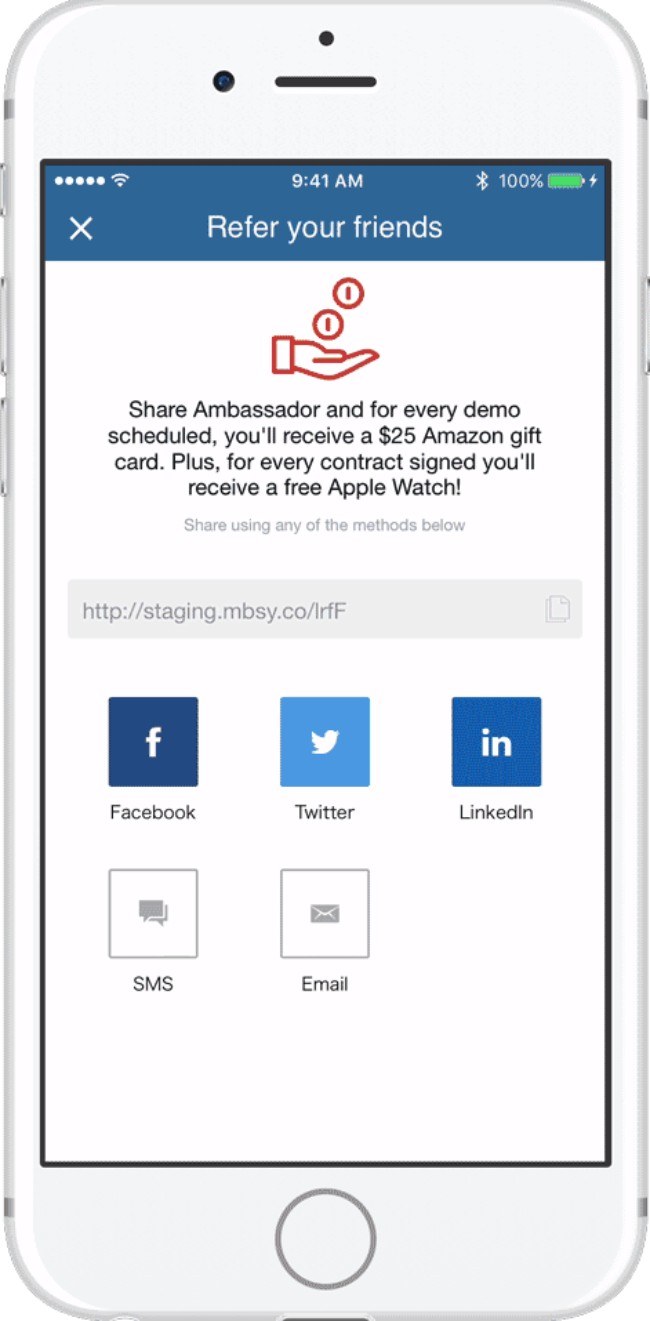
- The ability to have lots of campaigns going at one time – Ambassador supports an unlimited number of campaigns. Whether you're running partner, affiliate or refer-a-friend campaigns, you can set them up and have full access to them from the backend of Ambassador. This is great because you're more than likely going to want mutiple affiliate links for your separate products. No one wants to get referred to a product then suddenly end up on a company's homepage. This not only gives your affiliates more flexibility, but you can also have multiple refer-a-friend campaigns running for different companies or products.
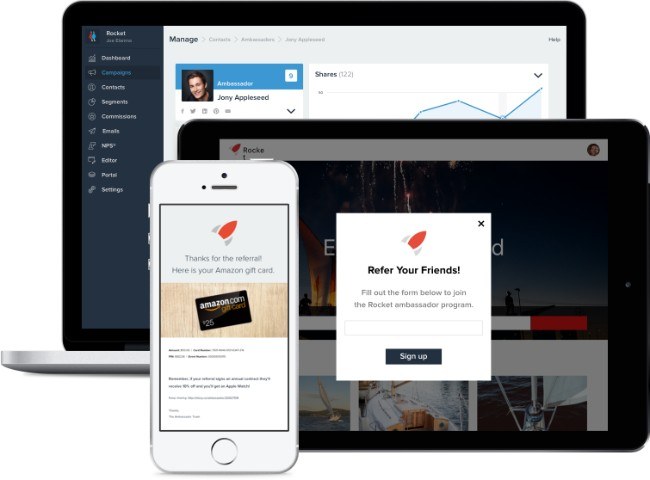
- Automated and fast payouts to your affiliates – Ambassador includes automated payouts to your affiliates. This way, you don't have to think about paying these people every one or two weeks. Furthermore, the affiliates are going to be much happier since they dont have to keep contacting you to send their money. We also like this because all of the automated payments get logged in the reports. Once again, you're not required to do anything manually here. The system takes care of the majority of tasks, and all you have to do is check-in once in a while to make sure you're making enough money to justify the program. Finally, the fast and customizable payouts are what your affiliates need to see. You're not going to make any friends with bloggers if they have to wait until the end of the month to get paid. Make your affiliates and referral customers happy by delivering the fastest payouts possible.
- Integrations with CRMs – Ambassador combines with any customer relationship maagement software you currently run for your company. This might sound like a hassle when it comes to the integration, but Ambassador handles the entire onboarding process. Therefore, all you have to deal with is telling them which CRM your company utilizes. They might need some login credentials, but other than that you're good to go. With the CRM integration you get to keep track of the affiliates and referral customers just like you would any other client or customer. You might have conversations with them that can get logged in the CRM. You might also have boxes in the CRM that indicate how much in sales each affiliate brings in for your company. Basically, this is an ingenious way to keep track of your rock star affiliates.
- Email automation – This kind of ties into the fast payouts and CRMs, but the email automation from Ambassador sends out messages to those involved in the referrals. You get to customize everything said in the emails, but after that, you don't have to think about it anymore. Ambassador has branding and whitelabeling tools so that customers know where the messages came from, and you can also personalize them if needed.
- Advanced reports and analytics – Do you want to see how many affiliates are in your program? What about the amount of money one or two of your best refer-a-friend customers have accumulated for your business? All of this is outlined in one of the most powerful analytics modules in the business.
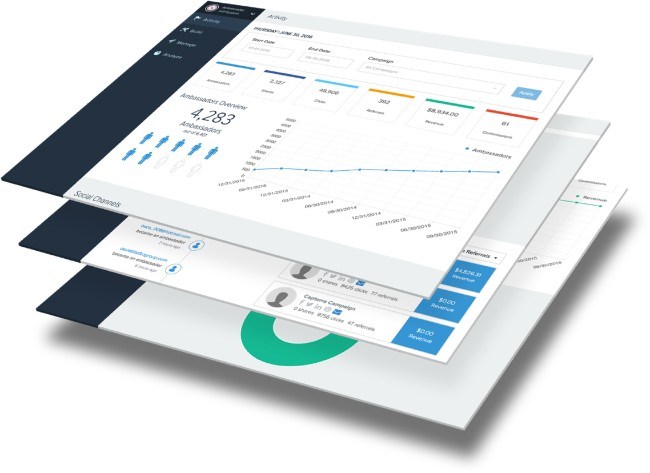
- Multiple currencies and languages – Having multiple currencies is starting to become standard for websites and plugins, but that's not the case with currencies. Ambassador makes it possible to have an affiliate on the other side of the world. Let's say your company is in Chicago. But a blogger in Japan wants to share your wonderful products with her readers. Guess what? Not only can the blogger get paid in Japanese yen, but they can understand the whole process because it'll be in the Japanese language.
How the Competitors Compare
We've come a long way through this article to understand the advantages of the top-tier referral software. Ambassador sure looks enticing with it's abundant set of features. However, not everyone is going to need such a strong program.
The runner-up, Referral Candy, definitely has more modern looking templates. It's also easier to adjust them if you're not as skilled with coding. Referral Candy also has much lower pricing for those smaller companies that can't quite justify spending too much money on a referral program just yet. In addition, we like Referral Candy because of its ease-of-use. The beginners out there might get a little intimidated by the way Ambassador looks and functions. It's a huge suite of tools. A nicely organized suite, but some people aren't up for that type of undertaking. Therefore, Referral Candy gets our vote as the best solution for beginners.
Affiliately is the most basic, so if you're looking for a barebones affiliate program, that's the one to go with. It's also the most affordable for those companies that maybe haven't started bringing in income but still have the brains to start an affiliate or referral program.
Some Final Thoughts and Things to Remember
When shopping for the best referral software, Ambassador is by far the best one to at least test out first. The company offers a free demo for those serious about getting people to talk about their company. And the onboarding process is one of the quickest in the business. I'd recommend Ambassador if your site is based on Shopify, since it integrates so well.
I like ReferralCandy for those companies that have a keen eye for design. Its templates beat out most of the competition, so it's worth looking at.
Affiliately has the best pricing, so the budget-conscience companies should end up going with that. However, Referral Candy isn't that far off when it comes to cost. And Referral Candy has more tools to play around with. But in the end it's up to you if you need to stick to a certain budget.
Overall, you should rememeber how powerful a referral software can be for any size business. Feel free to bookmark this article for future reference, and share with anyone you know who's stuggling with the referral software decision. And let us know if you have any questons in the comments section below!


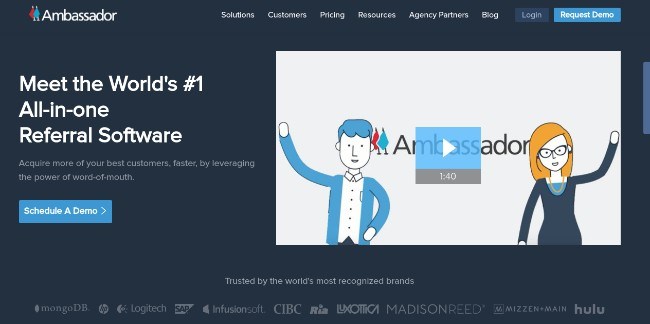



Thanks for your review and opinion, but I looked at Ambassador and their starter plan is $800/mo! Hardly sounds like that pricing is definitely not geared toward startups contrary to what you say: “but it has plans for all sorts of businesses, from small startups to huge conglamerates.”
This pricing looks clearly like it’s designed for big companies or huge conglomerates only.
Impressive , thank you for giving clear explanation.